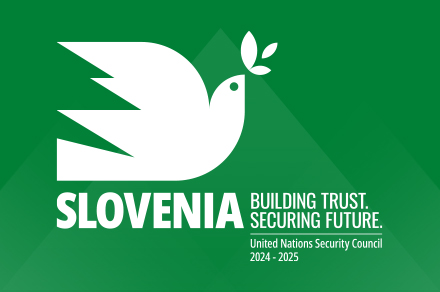Slovenia in the UN
Slovenia joined the UN on 22 May 1992. A staunch supporter of effective cooperation of countries within international organisations, it strives within the UN to secure a better tomorrow by enhancing international peace and security, supporting sustainable development, strengthening international law, protecting human rights, promoting democracy, and combatting climate change. Slovenia advocates for effective multilateralism and supports reforms within the Organisation.
Through UN membership, Slovenia ensures that its interests, values, and opinions are known and taken into account both at the negotiating table and in the Organisation's day-to-day work.
News
-
Highlights of Slovenia's activity in the UN Security Council in November 2024
-
COP29: Documents adopted in overtime
-
Conclusion of Third Committee of 79th UN General Assembly
-
State Secretary Štucin calls for more decisive action in Gaza and Ukraine at the UN Security Council
-
Conference of the Parties to the UN Framework Convention on Climate Change starts its 29th meeting
Sustainable development
As a developed, responsible, and active country, Slovenia co-shapes policies and measures for addressing global development challenges. Together with its partners, Slovenia contributes to a sustainable, just, inclusive, and safe future for all. By implementing the 17 Goals listed in the 2030 Agenda for Sustainable Development, which was adopted by the UN Member States in 2015, and the commitments set out in the Paris Agreement on climate change, Slovenia aims to ensure peace, security, prosperity, and a decent life for both present and future generations.
Human rights
Slovenia's human rights stance was a vital element in its efforts to gain independence, which is why it is striving to act progressively and strengthen human rights around the globe. Slovenia participates in the activities of the UN General Assembly Third Committee on Social, Humanitarian and Cultural Issues, which focuses on human rights.
Slovenia supports the activities of the Human Rights Council (HRC), a special body within the UN system, and actively participates in its work in accordance with the national priorities. It was a member of the HRC twice, from 19 June 2007 to 19 June 2010 and from 1 January 2016 to 31 December 2018, and presided over it in 2018.
Slovenia is a candidate for membership for the 2026–2028 period. It strives for the efficiency of this central UN human rights body, which should consider all aspects of human rights, and for the implementation of its decisions. Slovenia also participates in the Universal Periodic Review.
For more details on Slovenia's human rights efforts, please visit the topic Human rights in Slovenian foreign policy.
Natural and cultural heritage
With its rich history and diverse natural environment, Slovenia advocates intercultural dialogue, tolerance, and the preservation of natural and cultural heritage, especially in the framework of UNESCO.
For more information, please visit Slovenia's cultural heritage webpage.
International peace and security
The UN was primarily established to maintain international peace and security, since these are the prerequisites to stability and development. To help countries along their arduous path from conflict to peace, Slovenia has been involved in UN peacekeeping operations since its independence. Slovenia also participates in operations and missions led by NATO, the EU, the OSCE, as well as in those based on other international agreements.
Combatting terrorism and arms control are vital to maintaining international peace and security. For more information, please visit Counter-terrorism efforts and Arms control.
Preventive diplomacy, mediation, and the Responsibility to Protect
Slovenia devotes much attention to preventive diplomacy and mediation, as prevention is better than reaction to crises and armed conflicts. Convinced that preventive diplomacy can prevent disputes from becoming conflicts, and that mediation can prevent conflicts from escalating into armed conflicts, Slovenia strives to make these two areas more prominent within the UN.
Slovenia has actively supported the Responsibility to Protect (R2P) concept from its inception. It was among the first countries to set up a national R2P Focal Point. It is part of the Group of Friends of the Responsibility to Protect, which operates in New York and Geneva. Members of the Group encourage discussion on responsible sovereignty, the prevention of serious international crimes, and the implementation of the principle in practice. Slovenia is also a member of the ACT Group, which advocates more accountability, coherence, and transparency in the work of the UN Security Council by urging its members not to vote against resolutions that would facilitate prompt and decisive action in cases of genocide, crimes against humanity, and war crimes. In May 2016, Slovenia endorsed the Kigali Principles on the Protection of Civilians.
Atrocities prevention is the main focus of Slovenia's activities in support of R2P. In this context, the UN-published Framework of Analysis for Atrocity Crimes, A tool for prevention was translated into Slovene.
Documents
-
Slovenia's priorities in the United Nations
The document outlines Slovenia's annual priorities within the UN system.Plan -
Slovenia's 10 years in the UN
On 22 May 1992, Slovenia became a full member of the United Nations. This was a historic moment for the country in the process of gaining independence and securing international recognition.Brochures


